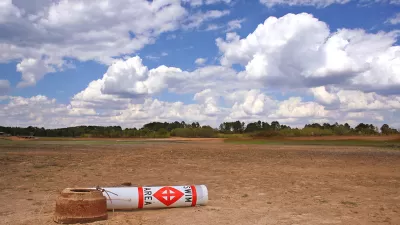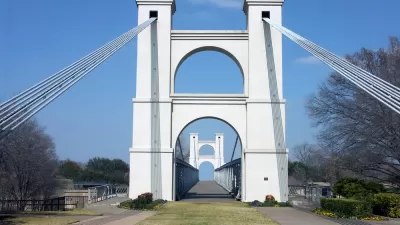Robert Glennon, author of the new book "Unquenchable" outlines the nature of America's emerging water crisis, and how ending water subsidies could encourage efficiencies and conservation.
Treehugger's Jaymi Heimbuch interviews Robert Glennon about water misuse and wastage. Glennon argues that we're overdrawing aquifers and that agricultural uses are particularly overconsumptive.
"The carbon footprint of water is gigantic...To consider one example, 19 percent of all of the electricity used in California is for the purpose of pumping, treating, transporting, and delivering water. I do not foresee moving people out of cities, but I do predict severe environmental damage. Unsustainable groundwater pumping and excessive diversions from our rivers will reduce the quality and quantity of water, and in many places we will see earth subsidence, saltwater intrusion, and earth fissures or sinkholes.
I hope it does not come to this. There is no doubt that the United States is facing a water crisis, but a crisis is a time of opportunity when there are still choices to be made...My vision is that, if water was not subsidized, individual citizens, businesses and farmers would pay the real costs, and water would become much more expensive. After the outrage, we'd see the prices drive conservation and push waste out of the system."
FULL STORY: What's the Single Biggest Misuse of Water in the US?

Maui's Vacation Rental Debate Turns Ugly
Verbal attacks, misinformation campaigns and fistfights plague a high-stakes debate to convert thousands of vacation rentals into long-term housing.

Planetizen Federal Action Tracker
A weekly monitor of how Trump’s orders and actions are impacting planners and planning in America.

San Francisco Suspends Traffic Calming Amidst Record Deaths
Citing “a challenging fiscal landscape,” the city will cease the program on the heels of 42 traffic deaths, including 24 pedestrians.

Defunct Pittsburgh Power Plant to Become Residential Tower
A decommissioned steam heat plant will be redeveloped into almost 100 affordable housing units.

Trump Prompts Restructuring of Transportation Research Board in “Unprecedented Overreach”
The TRB has eliminated more than half of its committees including those focused on climate, equity, and cities.

Amtrak Rolls Out New Orleans to Alabama “Mardi Gras” Train
The new service will operate morning and evening departures between Mobile and New Orleans.
Urban Design for Planners 1: Software Tools
This six-course series explores essential urban design concepts using open source software and equips planners with the tools they need to participate fully in the urban design process.
Planning for Universal Design
Learn the tools for implementing Universal Design in planning regulations.
Heyer Gruel & Associates PA
JM Goldson LLC
Custer County Colorado
City of Camden Redevelopment Agency
City of Astoria
Transportation Research & Education Center (TREC) at Portland State University
Jefferson Parish Government
Camden Redevelopment Agency
City of Claremont





























